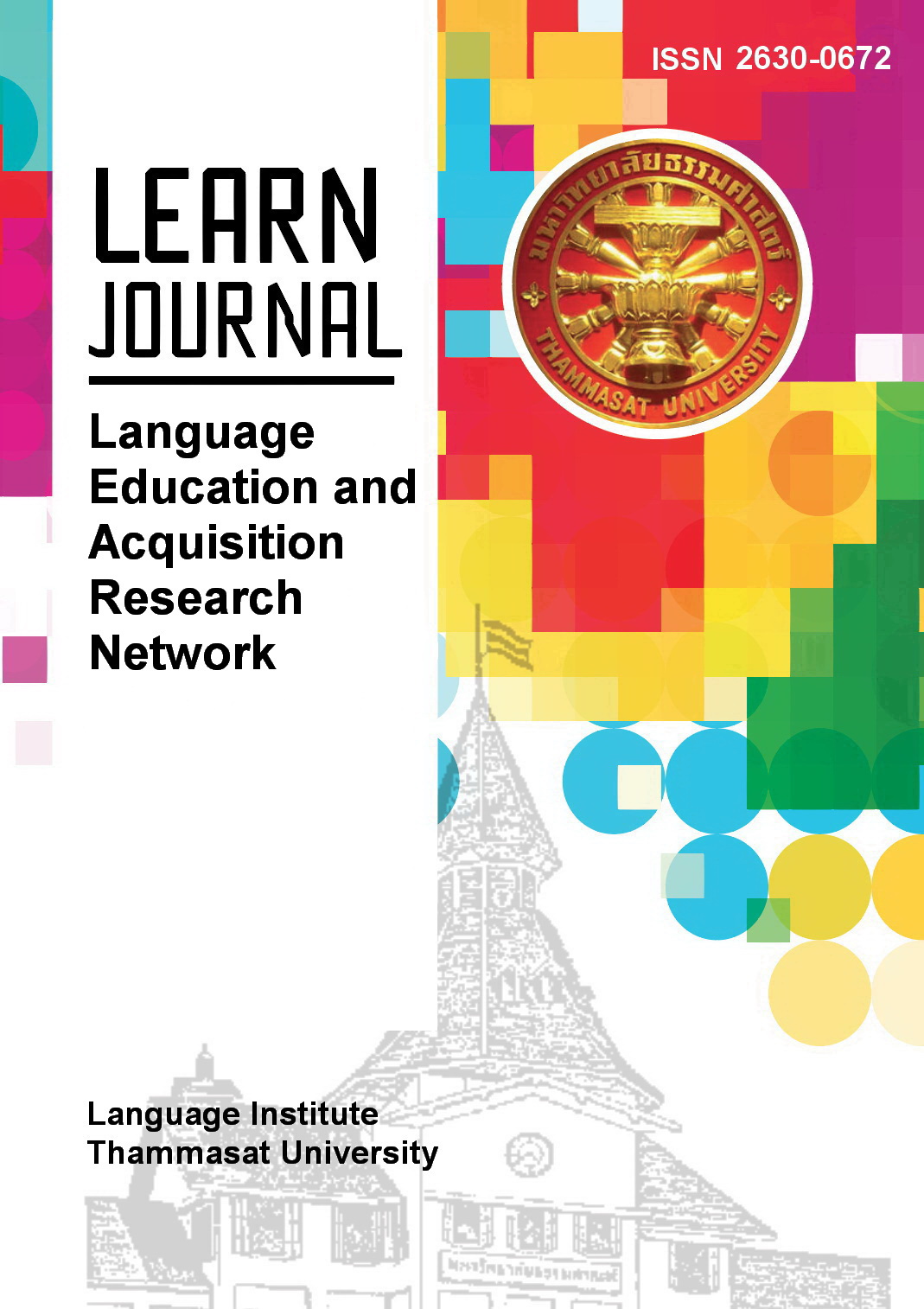Unveiling the Relationship between the Grit of Thai English Language Learners, Engagement, and Language Achievement in an Online Setting
Main Article Content
Abstract
Past research has found that an individual’s academic success, including success in English language learning, can be predicted by a person’s ‘grit’. Grit is a personality trait defined as the combination of perseverance of effort and consistency of interests. Other than grit, learner engagement is another factor considered to be highly related to levels of academic achievement. However, the paradigm of English language learning has transitioned to online settings. Therefore, it is important to know how students’ grit is affected by such a transition. The purpose of this study is to investigate the grit and online engagement of 563 Thai English language learners (ELLs) and to study the relationship between Thai ELLs’ grit, learner engagement, and their English language achievement in online settings. Grit scales and online engagement scales were used to collect the data. The present study found that grit positively correlates with language achievement and engagement. Furthermore, it also found that grit is a predictor of language achievement while online engagement demonstrated no predictive value to language achievement. The results are aligned with, and corroborate, the work of Teimouri et al. (2020) suggesting that grit is associated with success in English language learning.
Article Details
References
Aguilera-Hermida, A. P. (2020). College students’ use and acceptance of emergency online learning due to COVID-19. International Journal of Educational Research Open, 1.
https://doi.org/10.1016/j.ijedro.2020.100011
Broghammer, S. M. (2017). Grit as a predictor of academic success for first-time undergraduate students (Publication No. 463) [Doctoral dissertation, University of Northern Colorado].
https://digscholarship.unco.edu/dissertations/463.
Brown, H. D. (2015). Teaching by principles: An interactive approach to language pedagogy (4th ed.). Pearson Education.
Chen, G., Jin, Y., Liang, W., & Liu, Y. (2021). Study on the influence of middle school students’ self-efficacy on the willingness to use online learning platform. The International Journal of Electrical Engineering & Education. https://doi.org/10.1177/0020720920984030
Christopoulou, M. I., Lakioti, A., Pezirkianidis, C., Karakasidou, E., & Stalikas, A. (2018). The role of grit in education: A systematic review. Psychology, 9, 2951-2971.
Dincer, A., Yeşilyurt, S., Noels, K. A., & Vargas Lascano, D. I. (2019). Self-determination and classroom engagement of EFL learners: A mixed-methods study of the self-system model of motivational development. SAGE Open.
https://doi.org/10.1177/2158244019853913
Dixson, M. (2015). Measuring student engagement in the online course: The Online Student Engagement Scale (OSE). Online Learning, 19(4). http://dx.doi.org/10.24059/olj.v19i4.561
Dörnyei, Z., & Ryan, S. (2015). The psychology of the language learner Revisited. Routledge.
Duckworth, A. L., Peterson, C., Matthews, M. D., & Kelly, D. R. (2007). Grit: Perseverance and passion for long-term goals. Journal of Personality and Social Psychology, 92(6), 1087-1101.
https://doi.org/10.1037/0022-3514.92.6.1087
Duckworth, A. L., & Quinn, P. D. (2009). Development and validation of the Short Grit Scale (Grit-S). Journal of personality assessment, 91(2), 166-174. https://doi.org/10.1080/00223890802634290
EF. (2021). The world's largest ranking of countries and regions by English skills. EF. https://www.ef.com/ca/epi/regions/asia/thailand/.
Fredricks, J. A., Blumenfeld, P. C., & Paris, A. H. (2004). School engagement: Potential of the concept, state of the evidence. Review of Educational Research, 74(1), 59–109.
https://doi.org/10.3102/00346543074001059
Griffiths, C., & Soruç, A. (2020). Individual differences in language learning. Palgrave Macmillan. https://doi.org/10.1007/978-3-030-52900-0
Han, K. (2021). Fostering students' autonomy and engagement in EFL classroom through proximal classroom factors: Autonomy-supportive behaviors and student-teacher relationships. Frontiers in Psychology, 12. https://doi.org/10.3389/fpsyg.2021.767079
Lake, J. (2013). Positive L2 self: Linking positive psychology with L2 motivation. In M. Apple, D. Da Silva, & T. Fellner (Eds.), Language learning motivation in Japan (pp. 225-244). Multilingual Matters. https://doi.org/10.21832/9781783090518-015
Lee, J. S., & Lee, K. (2019). Affective factors, virtual intercultural experiences, and L2 willingness to communicate in in-class, out-of-class, and digital settings. Language Teaching Research, 24(6), 813-833. https://doi.org/10.1177/1362168819831408
Lei, H., Cui, Y., & Zhou, W. (2018). Relationships between student engagement and academic achievement: A meta-analysis. Social Behavior and Personality, 46(3), 517-528.
https://doi.org/10.2224/sbp.7054
Lin, C. L. S., & Chang, C. Y. (2017). Personality and family context in explaining grit of Taiwanese high school students. Eurasia journal of mathematics, science and technology education, 13(6), 2197-2213. https://doi.org/10.12973/eurasia.2017.01221a
Pellegrino, J. W., & Hilton, M. L. (2012). Education for life and work. The National Academies Press.
Schmitt, N., & Rodgers, M. P. H. (2019). An introduction to applied linguistics (3rd ed.). Routledge.
Strayhorn, T. L. (2014). What role does grit play in the academic success of black male collegians at predominantly white institutions? Journal of African American Studies, 18(1), 1–10.
https://doi.org/10.1007/s12111-012-9243-0
Teimouri, Y., Plonsky, L., & Tabandeh, F. (2020). L2 grit: Passion and perseverance for second-language learning. Language Teaching Research. https://doi.org/10.1177/1362168820921895
Wei, R., Liu, H., & Wang, S. (2020). Exploring L2 grit in the Chinese EFL context. System, 93. https://doi.org/10.1016/j.system.2020.102295
Wu, Y. T., Foong, L.Y.Y., Alias, N. (2022). Motivation and grit affects undergraduate students’ English language performance. European Journal of Education Research, 11(2), 781-794.
https://doi.org/10.12973/eu-jer.11.2.781
Xie, K., & Huang, K. (2014). The role of beliefs and motivation in asynchronous online learning in college-level classes. Journal of Educational Computing Research, 50(3), 315–341. https://doi.org/10.2190/EC.50.3.b
Zhao, Y. (2018). Student engagement in postsecondary English classes in
China: The teachers' perspective. (Publication No. 10979816) [Doctoral dissertation, Kansas State University]. ProQuest Dissertations Publishing.
Zheng, C., Liang, J. C., Li, M., & Tsai, C.C. (2018). The relationship between English language learners’ motivation and online self-regulation: A structural equation modelling approach. System, 76, 144-157. https://doi.org/10.1016/j.system.2018.05.003


